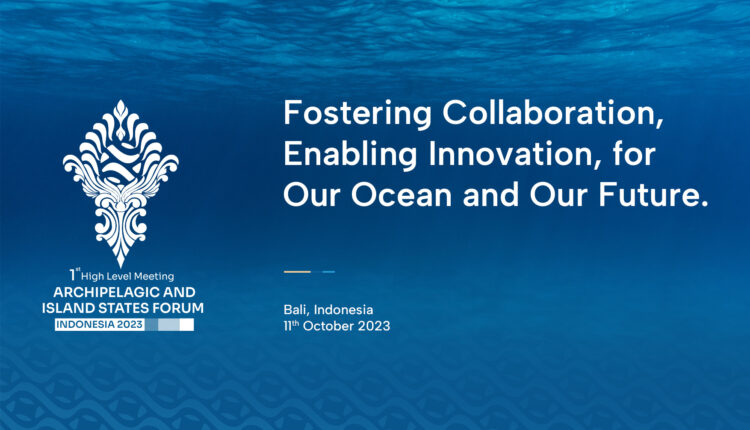Hosting the AIS Summit, Indonesia is Committed to Preserving Marine and Coastal Ecosystems
By: Gema Octoyudha
His appointment to host the Archipelagic and Island State (AIS) Summit (Summit) in Nusa Dua, Bali on 10-11 October shows the world’s confidence in the Indonesian government’s handling of the climate crisis.
The AIS Summit is a forum for cooperation between island and archipelagic countries around the world which aims to strengthen collaboration to overcome global problems, especially maritime development. As the largest archipelagic country in the world, through this forum Indonesia is expected to become an initiator in dealing with global issues related to maritime affairs. The AIS Summit has the potential to produce agreements that will lead to improvements in the quality of coastal and marine ecosystems.
Coordinating Minister for Maritime Affairs and Investment, Luhut Binsar Pandjaitan, said that island countries in the Pacific are very interested in the AIS Forum. Many small countries in the region could disappear if sea levels rise due to rising Earth temperatures due to the climate crisis.
Therefore, at AIS Forum meetings, Indonesia always has the best experiences, such as replanting mangroves, handling coral reefs, marine debris and digitalization. He claimed that Indonesia could be an example for AIS Forum members.
Regarding handling the climate crisis, the government will not make policies that will destroy future generations. Indonesia is very rich in natural resources and Indonesia is one of the countries that has succeeded in reducing the amount of plastic waste in the sea by up to 39 percent.
Acting Expert Staff for Economic, Social and Cultural Affairs of the Ministry of Maritime Affairs and Fisheries, Hendra Yusran Siry, explained that as an archipelagic country, Indonesia has more than 17 thousand islands and two-thirds of its territory is ocean with the second longest coastline in the world.
Indonesia is also one of the countries that processes the most waste on land, thereby reducing the amount of waste entering the sea. Indonesia has also succeeded in planting mangroves on 600 thousand hectares of land next year and reducing the rate of deforestation.
According to him, Indonesia has the potential to produce environmentally friendly electrical energy of 3,600 gigawatts, including solar panels. Indonesia is finalizing a 62 gigawatt renewable energy project with the United Arab Emirates.
Of the 17 thousand islands in Indonesia, almost 80 percent are small islands (less than 200 square kilometers according to the United Nations). Indonesia is also a meeting area for two important currents, namely the Indian Ocean and the Pacific Ocean, making Indonesia’s marine area a center of biodiversity.
The current challenge is how to optimize the management of these natural resources. The Ministry of Maritime Affairs and Fisheries has five environmentally friendly economic policies, including how Indonesia can conserve up to 30 percent of Indonesia’s waters.
The summit is a good momentum to forge regional and global agreements, and can also influence improvements in the quality of coastal and marine ecosystems, especially from marine pollution by plastic waste. Pollution in the sea does not only come from one location. Pollution also comes from various regions in the world because the sea is connected to various countries. According to him, the trash and pollutants that pollute DKI Jakarta’s seas do not only come from Jakarta, but can come from other regions or even countries.
Meanwhile, the decline in the quality of coastal and marine ecosystems can affect various aspects of life ranging from ecology, social, to economic. In the social aspect, the presence of plastic waste can reduce coastal aesthetics which reduces people’s comfort in enjoying the beauty of the coast and the potential for developing marine tourism. For the ecological aspect, plastic waste can injure marine biota and the microplastic content that enters the bodies of fish can affect human health.
Tourism observer from Jenderal Soedirman University (Unsoed), Chusmeru assesses the importance of holding the 2023 AIS Forum Summit in Bali in order to maintain the sustainability of Indonesia’s seas in a future full of challenges. One of them is the challenge of coastal exploitation and marine pollution.
Holding the 2023 AIS Forum Summit is also said to be able to bring benefits to the development of coastal tourism in Indonesia because it will create collaboration and innovation among forum members. Chusemeru believes that the development of coastal tourism should be handed over to tourist villages because they have Human Resources (HR) who know exactly about the tourism potential in their area.
Apart from that, tourist village managers are also considered to know exactly how to preserve the environment in their area. On the other hand, the development of coastal tourism by tourist villages is also an effort to accelerate integrated village development to encourage the welfare of the community in it. A developed tourist village can later have a domino effect in the form of improving environmental quality, community welfare and cultural preservation.
He believes that if coastal development is dominated by investors coming from outside the village, it is feared that coastal exploitation will occur in Indonesia which will have an impact on environmental sustainability. To achieve the target of coastal tourism in Indonesia, it needs to be developed in the form of quality tourism, not quantity tourism (prioritizing the number of tourists) by prioritizing the principles of sustainable tourism .
For this reason, quality tourism must selectively attract incoming tourists, to ensure that only tourists who meet the qualifications and are truly recreation-oriented as well as concentrating on the environment can enter coastal tourist areas.
Indonesia’s courage to start taking a leadership role in international forums such as the 2023 AIS Summit has certainly overcome many challenges. One of them is the problem of domestic self-confidence. This is because Indonesia is a developing country with limited resources. Despite this, Indonesia remains optimal in organizing this event and is not inferior to other developed countries.
)* The author is a student at the NHI Bandung Tourism Polytechnic
